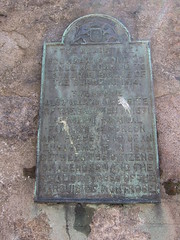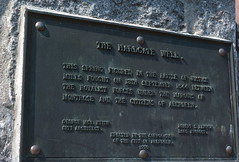Commemorated on 3 plaques
The Crabstone. Boundary stone of the lands belonging to John Crab, Baillie of the Burgh in 1314. The stone also marks the site of the skirmish in 1571 between the rival families of Gordon and Forbes and of an engagement in 1644 between the citizens of Aberdeen and the royalist forces of the Marquis of Montrose.
Langstane Place, Aberdeen, United Kingdom where they fought (1644)
The Hardgate Well. This spring figured in the Battle of Justice Mills fought on 13th September 1644 between the Royalist forces under the Marquis of Montrose and the citizens of Aberdeen.
Hardgate, Aberdeen, United Kingdom where they fought (1644)
In a house on or near this site James Graham Marquis of Montrose spent the night before the Battle of Philiphaugh on 13th September 1645 "A Candidate for Immortality" Wishart
?, Selkirk, United Kingdom where they stayed (1645)



